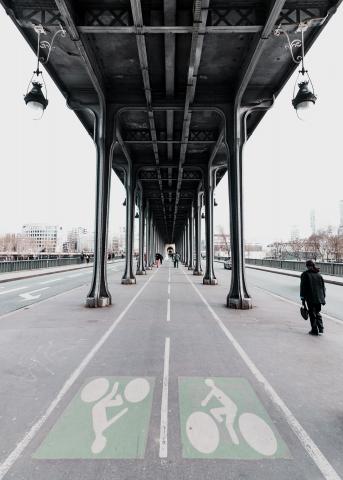COVID-19 has quickly developed from a global health crisis into what is likely to become the most severe economic crisis since the early 20th century. Governments the world over are struggling to protect large parts of their populations from falling into poverty, and their businesses from bankruptcies, by mobilizing and distributing massive public funding. While part of that funding is reserved to cushion the worst effects in the short term, the mid to longer term will see massive amounts of funding go into efforts to restart global economies.
While our daily lives are currently being turned upside down by the impacts of COVID-19, another global crisis keeps unfolding. For many years, virologists have warned us that it is not a question of whether, but only when, a global pandemic such as COVID-19 will occur. Similarly, scientists have been warning us about multiple environmental crises, developing more slowly, but with potentially much more severe impacts than the coronavirus. Despite progress in some green technologies, such as renewable energies, we have not succeeded in the fundamental restructuring of our economies, which is needed to stay in line with planetary boundaries.
To initiate this restructuring, various world regions have been discussing different versions of “Green New Deals”. The European Union, for example, aims to reduce net greenhouse gas emissions to zero by 2050 and decouple economic growth from resource use, while leaving no person and place behind. It aims to mobilize at least €1 trillion of investments in the coming 10 years, with its “Just Transition Mechanism” channeling more than €100 billion into the most affected regions. US Democrats have been discussing their version of a Green New Deal, which, should a change in government occur by the end of this year, may gain renewed traction. Already in the wake of the financial crisis, South Korea has used part of its recovery funds to restructure the economy towards green growth, and has recently renewed its ambition by pledging to reduce greenhouse gas emissions to net zero by 2050.
While the South Korean Green Deal seems to be met by broad-based support in the population, demonstrated by the landslide victory of the Democratic Party in April 2020, other countries’ Green Deals have started to be overshadowed by the immediate needs caused by the pandemic. Many argue that revitalizing the economies should be the key priority even if it means relaxing environmental regulation and taking advantage of abundant cheap oil. With a growing number of competing claims for public funding, lobbying power against any Green New Deal is likely to be fierce. Czech Prime Minister Andrej Babis, for example, already told the EU to “forget about” the Green Deal and focus on fighting the effects of the coronavirus crisis.
Yet, the disruption that is part and parcel of a deep crisis may also open windows of opportunity to radically rethink and restructure our economies. Some parts of a Green New Deal may even be easier to implement now than before the crisis. The German Foundation 2° has coordinated a statement of 68 German and international businesses, demanding a climate stimulus programme and signed by industry giants such as Allianz, Bayer, DHL, E.On, Ikea, Osram, thyssenkrupp and Unilever.
This discussion shows that while it is imperative to address the environmental and health crises simultaneously, Green Deal solutions need to be acceptable by citizens, businesses and governments. But they will differ according to country contexts. Countries with high levels of fossil fuel subsidies, for example, may now face a historic opportunity to use depressed oil prices to relieve their public budgets from subsidizing environmentally harmful fuels. Now may even be a window of opportunity to introduce or increase carbon pricing and to channel the mobilized funds into green investments. Countries with weak social security systems and substantive shares of informal employment will need other solutions than those with functioning unemployment schemes which cover most of the population.
 Green public works programmes, for example, can go a long way to ensuring basic levels of income while benefitting the environment. Energy and resource efficiency, in particular in buildings, remain worthwhile investment opportunities in most country contexts, and less car traffic and an increase in bicycle use during lockdowns may have given us a glimpse into a more sustainable mobility future. As travel restrictions abound, local tourism holds the potential to create economic benefits at home and can help avoid emissions at the same time.
Green public works programmes, for example, can go a long way to ensuring basic levels of income while benefitting the environment. Energy and resource efficiency, in particular in buildings, remain worthwhile investment opportunities in most country contexts, and less car traffic and an increase in bicycle use during lockdowns may have given us a glimpse into a more sustainable mobility future. As travel restrictions abound, local tourism holds the potential to create economic benefits at home and can help avoid emissions at the same time.
While there are multiple win-win options, the pandemic – and the economic costs of the crisis and the recovery instruments – can also increase trade-offs by generating more intense competition for resources. Seemingly costly environmental measures are likely to face even stronger headwinds than without COVID-19. Supporters of the Green Deal movement should therefore identify those measures and approaches that can win the hearts and minds of people and can be implemented despite – or perhaps even due to – the global health crisis. To achieve the goals of the Green Deal movement, it will also be key to shape bailouts in non-green sectors. For example, state aid in industries such as aviation or automobiles should be subject to conditions that contribute to restructuring our economies. For instance, the spotlight should be on supporting fuel efficiency and e-mobility instead of subsidizing unconditional car scrapping.
In short, politically informed smart green transformations will prioritize win-wins over costlier reform processes that risk turning into dead ends and make sure as much environmental conditionality as possible is added to the non-green bailouts that will be part of economic recovery packages. In that case, the global Green Deal movement can, and will, survive the pandemic.
Tilman Altenburg is Head of Research Programme, and Anna Pegels and Clara Brandi are Senior Researchers at the German Development Institute/Deutsches Institut für Entwicklungspolitik (DIE)



